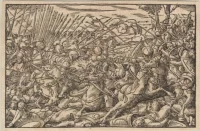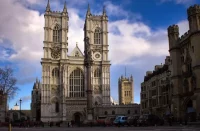What is the essence of Orthodoxy?
For some it is doctrinal rigour and its partisans are keen to sniff out any hint or whiff of possible heresy. Like modern Byzantine heirs of the Spanish Inquisition (now sadly expected by everyone online) they scroll through the pages of blogs and OCA catechetical manuals for imprecise or infelicitous phrases to denounce with a kind of triumphant joy.
For others it is liturgical fullness and precision. Dismissively labelled as “typikonchiki” by the late Fr. Alexander Schmemann, these zealots insist as a matter of supreme importance absolute conformity to every last detail of the Typikon, the monastic rule book offering details for how life (liturgical and otherwise) should be ordered in a monastery. Deviation from the requirements of the Typikon (such as the abbreviation of services or the serving of them at times other than those specified in the Typikon) are denounced as base betrayals of Orthodoxy and as symptoms of apostasy and theological liberalism.
I suggest another marker as the essence of Orthodoxy: love—specifically, love for God and its corollary, love for one’s neighbour. Or, in different words, devotion to Jesus Christ.
It is easy to imagine that the message that the Orthodox Church is called to bring to the world is—well, the Orthodox Church. That is, some imagine that we are called primarily to preach the superiority of the Orthodox Church over all other Christian denominations, focusing upon the beauty of our liturgical worship, the splendour of our icons, and the antiquity of our doctrine. I disagree. This would be, paraphrasing the words of St. Paul, to proclaim ourselves, rather than Christ Jesus. St. Paul said the opposite—that we should “preach not ourselves, but Christ Jesus as Lord and ourselves as your servants for Jesus’ sake” (2 Corinthians 4:5). We do not preach Orthodoxy, but Christ.
Obviously the Christ we preach is the One proclaimed by the apostles, the Church Fathers, the Ecumenical Councils, and enshrined in the historic Liturgy of the Church, rather than (say) the Christ proclaimed by the Mormons or the Jehovah’s Witnesses—or even by such people as the late Anglican bishop John Spong. That is, we preach the Orthodox Jesus, not (for example) the Mormon Jesus. But even so, we are called to preach Christ and His glory, not the reflected glory of the Orthodox Church. If we preached the glories of the Orthodox Church, that would indeed be preaching not Christ Jesus, but ourselves. And St. Paul would not be pleased.
 The essence of Orthodoxy is therefore found in our love for the Lord. As an example of such love and devotion, I would call your attention to a Bulgarian peasant noticed in his devotion by the late H.V.R. Morton almost a hundred years ago. The passage, though a bit lengthy, is worth quoting in full.
The essence of Orthodoxy is therefore found in our love for the Lord. As an example of such love and devotion, I would call your attention to a Bulgarian peasant noticed in his devotion by the late H.V.R. Morton almost a hundred years ago. The passage, though a bit lengthy, is worth quoting in full.
Morton was visiting the Church of the Holy Sepulchre and waiting for his turn to enter the Tomb of Christ. His turn was long delayed, because someone had entered the Tomb before him. Morton (in an account published first in 1934) recorded his experience:
“I could see a pilgrim kneeling at the sepulchre, so I waited in the small, dark ante-chamber outside. Becoming impatient, I bent down and, peeping through the low entrance, saw that the man inside was an old, bent peasant in ragged clothes, his feet in a pair of huge shoes made of felt. He was a Bulgarian who had come over in a pilgrim ship, and he had probably been saving up all his life for that moment.
He was kneeling at the marble slab and kissing it repeatedly, while tears ran down the deep wrinkles of his face and fell on the stone. His large, rough hands, the nails spilt and black with labour, touched the marble gently with a smoothing motion; then he would clasp them in prayer and cross himself.
He prayed aloud in a trembling voice, but I could not understand what he was saying. Then taking from his pocket various pieces of dirty paper and a length of ribbon, he rubbed them gently on the Tomb and put them back in his pocket.
Disturbed perhaps by my entrance, he rose up, the tears still falling and whispered something to me. We were now standing, our chests touching, and looking into his eyes, I realized that I was looking at real happiness.
This was his life’s dream. I had never seen such happiness before. Never in all my life have I beheld peace and contentment written so clearly on a human face. I would have given the world to have been able to speak to him, but we stood there in the Tomb of Christ. [The monk there] dipped a piece of cotton wool lightly in the oil of the lamp and with this made the sign of the Cross upon the peasant’s face.
The old man sank down on his knees and turned again to the Tomb, unwilling to leave, incoherent with faith and devotion, his big, scarred hands touching the marble lovingly as if stroking the hair of a child. Presently he backed out of the candle-light into the dim Chapel of the Angel.”
This, I suggest, illustrates the true essence of Orthodoxy: a devotion to Christ which brought a humble and poor peasant from Bulgaria to Jerusalem to venerate the Tomb of his beloved Master and Saviour, not forgetting to rub a few items on the Tomb as relics and mementos for those whom he loved back home. Doctrinal rigour is important, as is liturgical integrity—though perhaps the enforcement and performance of such things are best left to the clergy set apart to keep watch, and not to every zealot with a computer. But such things, when divorced from love for Christ (love such as was seen in the tears of the nameless Bulgarian peasant in Morton’s story) are not worth much.
St. Paul himself reminds us that love is the fulfillment of the Law, and that without love all our fine words are worth no more than the annoying clanging of a cymbal (Romans 13:10, 1 Corinthians 13:1). St. John reminds us that if we do not love our very visible neighbour then our claim to love the invisible God cannot be sustained (1 John 4:20). That is, the apostles taught that love for our Lord must necessarily overflow into our love for our neighbour. The Lord Himself taught that love for God must include as its corollary the love of one’s neighbour as oneself (Mark 12:28-31).
It is this love—a burning love for Christ that overflows into a love for those around you—that is the true essence of Orthodoxy. We forget this at our peril.
Source: No Other Foundation














Comments